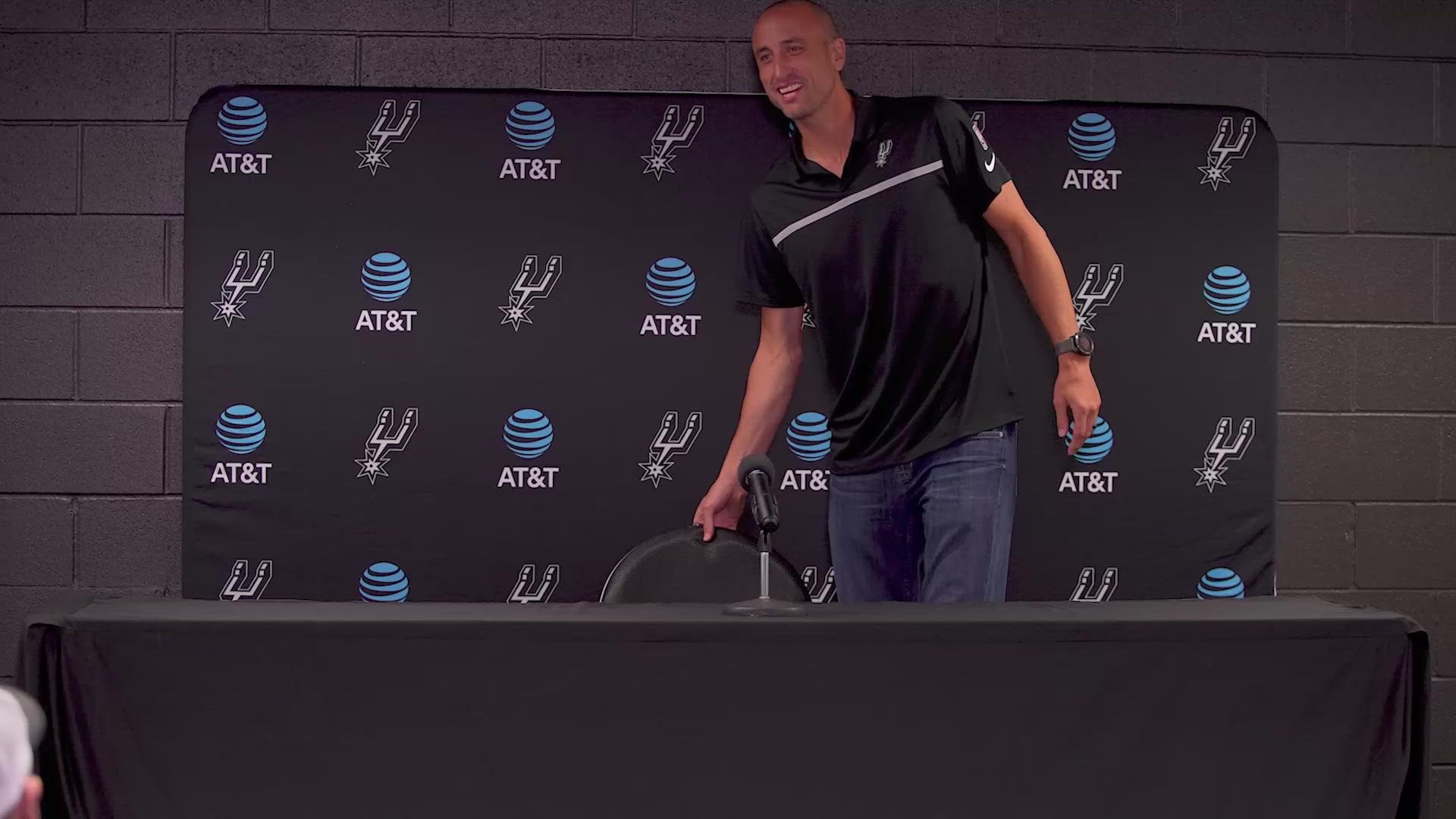SPRINGFIELD, Mass. — As the bat flies, the Argentinian city of Bahía Blanca is about 5,650 miles from Springfield, Massachusetts.
It’s a journey Manu Ginobili couldn’t have dreamed of making when he was a kid growing up in a basketball-obsessed part of a soccer-obsessed nation that had never seen a player reach the NBA before. A rare combination of talent and tenacity propelled him not just to the NBA, but to four championships, an Olympic gold medal, and a legendary career that changed the sport of basketball in a variety of important ways.
That legendary career is being recognized on Saturday as Ginobili becomes the first Argentine inducted into the Naismith Basketball Hall of Fame. He reflected on Friday about 5,650 miles from Bahía Blanca, and caught himself spoiling the speech he’s set to give the next day.
“What can I say? I mean, it's unreal that I’m here and in this moment, being inducted into the Hall of Fame. I guess nobody really expects to be in the Hall of Fame when they grow up. But you know, being from a small city in Argentina, a country that is known for their soccer teams, making it all the way to the NBA was for me at that point, already an unreachable dream,” he said.
San Antonio is the NBA team closest to the port city on the southeast coast of South America where Manu is from, and it’s still around 5,300 miles. He emerged from that basketball town as a singular sports hero both in San Antonio and to a country of soccer fans, a matter of civic pride in both places. He's a magical basketball player who transformed and transcended the game, and his enshrinement alongside the best to ever play the game is a celebration of that unique legacy, especially in both of his homes.

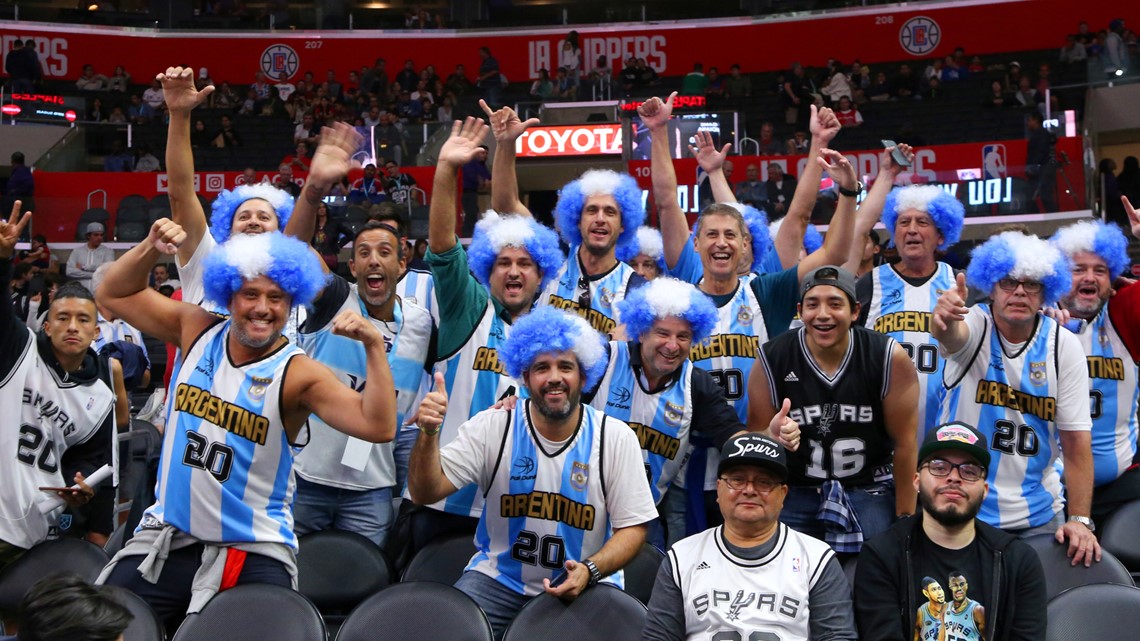
“Things started to happen year by year, year by year, improvement, growth, development and then one thing brought the other one. I get drafted, just by sheer luck, by one of the best franchises in the sport. And we start winning, and then when things start to happen like that, then you start thinking, ‘Oh, well, people are thinking that I may be going to be a Hall of Famer.’ I’d say that's ridiculous. But you know, at 45, a few years after retirement, here I am. So very unlikely outcome for a kid born where I was born, but super grateful of every single person and team along the way.”
Ginobili is one of two players in history to win a EuroLeague championship, an NBA title and an Olympic gold. He was Euroleague Finals MVP and top scorer for Virtus Bologna in the 2001 championship, a three-time All Star in the Italian League before he brought the Euro step stateside.
No, Manu didn’t invent the move. But not only did he bring his own flair and craft and use it to perfection as one of his on-court signatures, he popularized something that hadn’t been done in the NBA to the point that it literally changed the game of basketball forever. It went from unheard of to a necessity in any ballhandler's bag. If Dr. James Naismith saw Giannis do that his mind would collapse in on itself. And if you ask anybody about the Euro step, the first person they will mention is an Argentine.
Ginobili won an NBA ring in 2003, helped Argentina’s Golden Generation topple the US in 2004 and earn their name, then another title with the Spurs in 2005 to go with an All Star appearance, then another ring in 2007. That’s about as hot a five-year run of success as one can have in any field.
He would go on to win another title in 2014 with the timeless Beautiful Game Spurs. He made one more All Star Game and earned a Sixth Man of the Year award as he made his name synonymous with the role and became a shining example for anyone tasked with coming off the bench and providing some nasty. The acceptance of his role, the total focus on helping the team win are lasting, iconic, transcendent parts of his legacy.

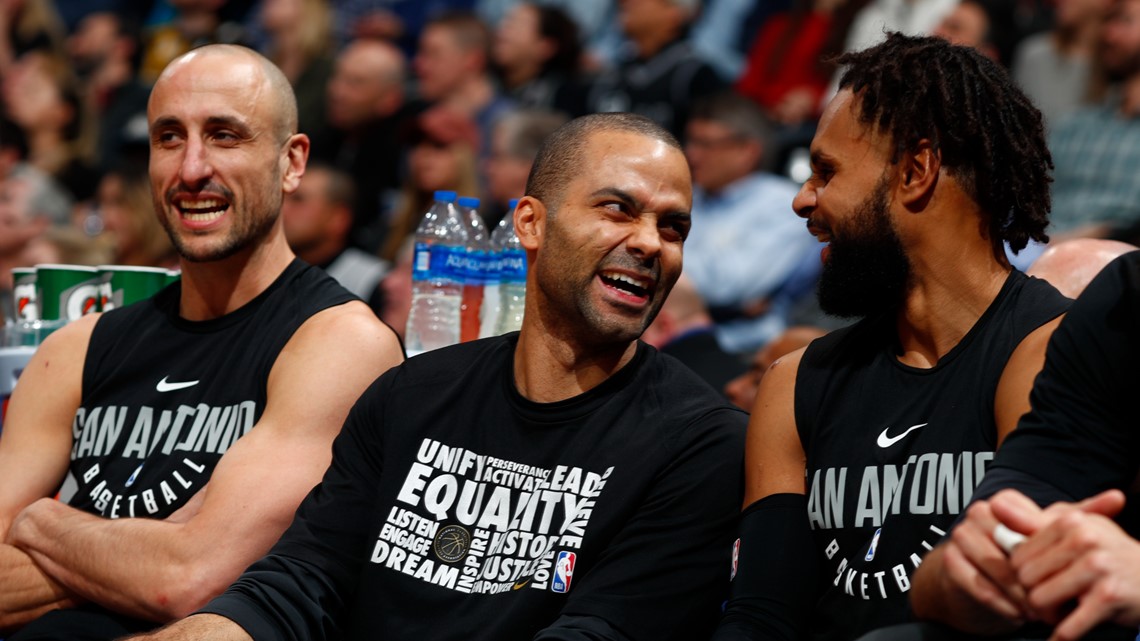
“I'm not the type of player that would have gotten here regardless, I needed great teams. My biggest accomplishments aren’t individual, not MVPs or things like that. I'm here because I played in incredible teams,” he said Friday. “I know that, I value that, so I’ve got to recognize a lot of people, coaches, teammates, physios, strength coaches all along my journey. So incredibly lucky to have played in teams that I played, having landed in very special teams in special times. So great to be celebrating with them and acknowledging them.”
Speaking of those special teams in special times, Ginobili knows how unbelievable it is that he was part of San Antonio’s "big three" for his entire playing career. He has a higher winning percentage than anyone else with at least a thousand games played at .721, followed closely by Tim Duncan and Tony Parker. Together they are the winningest trio in NBA history, coached by the winningest coach in NBA history.
“16 years playing for the same coach, with the same point guard, with the same power forward. And with many teammates, I played more than five, between five and 10 years. The same colors, the same community, the same fans, so I set roots there,” he said. “I've been incredibly lucky to have played for the best coach, the best power forward ever, a great point guard with multiple All Stars, and we created something very special, and something that doesn't… happen. You know, four guys on the same team playing 15 years together and winning four championships is unrealistic, but that's why I've been so lucky to have lived all that experience. Incredible.”

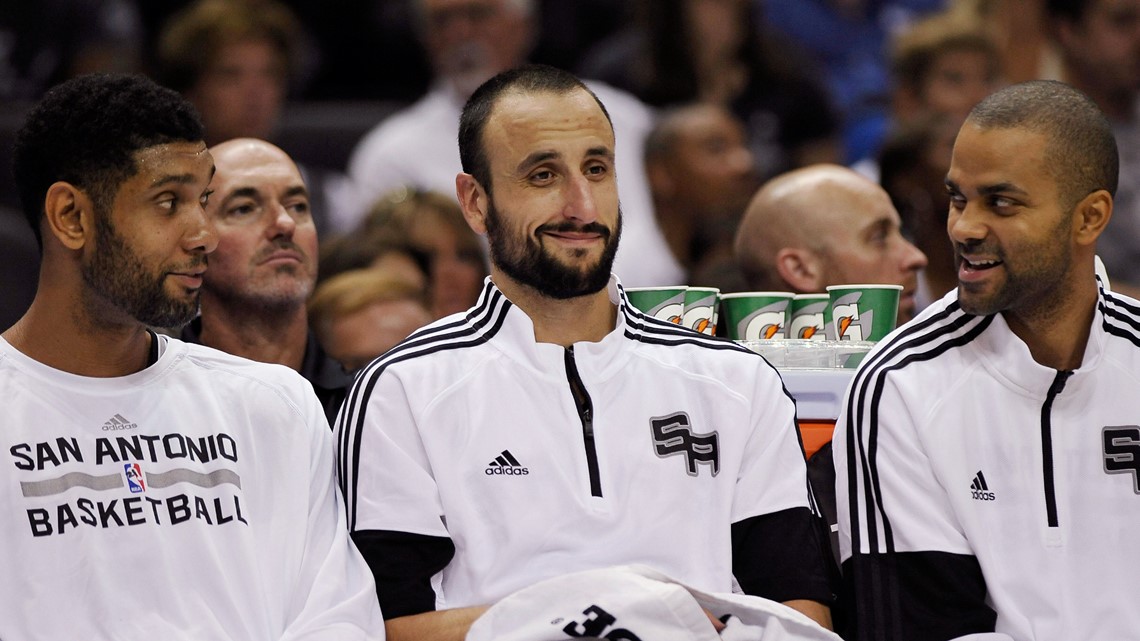
Alongside his crucial part in that NBA dynasty, Ginobili also played a starring role for his home country in one of the biggest upsets in the history of the sport. Argentina defeated the United States in Athens and claimed gold, and it fundamentally changed international basketball.
“We were one of the few countries that were starting to push the boundaries, right? That were starting to threaten the US, close games, 'til Indianapolis for the first time we were able to beat the US team. So I think it changed, it changed the way people faced those teams, face those tournaments, so the aim was not just to be there and take pictures with Dream teams, but go and challenge,” he said. “I was just talking about how lucky I've been and how unreal my experience with the Spurs was playing 16 years there. But I played with the national team for 17, 18 basically. I started in 98, finished in 2016, and again with a few of those guys… 18 years. So it's unbelievable that I was able to have two careers in parallel at such a high level, so successful. So when I start to think about it it’s just unbelievable. So very, very fortunate to have both experiences.”
Given what we know Manu Ginobili for, it’s no surprise that both of the teams he played for were defined by teamwork and winning. Those twin careers intertwined and fed off of each other. His success has undoubtedly helped to feed the international growth of the NBA’s fans and players that we’ve seen in the last 20 years, and according to Manu, the NBA played a major role in what his Argentina team accomplished on the world stage.
“What made our generation different, I mean, the timing. The world was changing in basketball, and everything because of the NBA. The NBA is what allows us also to flourish to grow because of what they generated with inspiration. And the NBA became a goal for all of us, so it made us work harder,” he said of his Argentinian teammates.
“And we were incredibly lucky to have a group of guys that were roughly born in the same age from 75 to 80. They were very talented, hard workers, and they got along. Sounds pretty simple, it just is not that simple, you see all over the world," he said. "Sometimes a great generation, but you’ve got three point guards and two shooting guards. We got the whole thing and we loved playing with each other, and we love hanging out. So it made us want to play together, and commit, and want to get better. So it was a very unique situation we faced. Maybe 1999 was the first time the core group got together and we started growing and growing and growing. And you know, the results are out there. I mean, we played together for as I said before, some: Nocioni, Scola, Oberto, we played almost 15 years together.”
No matter where in the world Ginobili was playing, no matter how old he was or which side of his unprecedented career he was adding to, his drive and competitive nature remained constant. Like the unselfishness, the intensity quickly became a calling card. On Friday, he confirmed that it’s just who he has always been.
“Yes, I noticed it very early on. I never looked for it, I didn't choose it, I didn't practice it, it was ingrained somewhere. I don't know if it's genes or something happened with my family that I got impregnated with that craziness. But my brother behind you could testify, I wanted to win with grades. I want to be a better student to him. I wanted to run faster. I wanted to… yes I did,” he said with a smile as his brother playfully tried to deny it. “And every time I was on the court, I wanted to win and I wanted to dive for a loose ball and I wanted to not lose too, that was another motivator. So yeah, it's not something that I chose. I know Pop talked about it all the time, I appreciate it, but I don't know if I can be proud of it because I never looked for it. It‘s just, you know, when the ball was in the air, I just had one goal and I wanted with my team to beat the opponent. But yeah, it was in every stage. I play tennis now, and I want to win, and I go ride the bike and I want to beat my time. So I assume it’s genetic or something, it’s natural. It's not healthy. I'm pretty sure I don't want my kids to be as competitive as me because most of the time you're going to lose. It's not fun when you're like that. But that's the way I was brought.”
Ginobili is doing a little bit of everything in his retirement, from taking the kids to school and riding his bike on the trails in San Antonio, to some world traveling with the family, to imparting wisdom around the Spurs’ practice facility. Anyone with basketball knowledge and sense knew that he’d make it to Springfield in his first appearance on the ballot, and that’s just what happened this year.
“I was in San Antonio, I knew the finalists were being announced,” he said. “The announcement came and it was only the finalists, but then you know, everybody was telling me, ‘It’s gonna happen, it’s gonna happen, you’re gonna be there,’ and so you say okay, I mean, they know better than me, I didn't know. I didn't know what the Hall of Fame was before coming to the States. I mean, I was completely clueless about the world of the NBA or basketball, American basketball. But then you start hearing rumors and people telling you you’re a future Hall of Famer, so you start believing it. And a few months ago [I] was in San Antonio and TJ called me and told me and I received the call. So it was when rumors become a reality. So incredibly honored, of course.”
Ginobili said picking Tim Duncan to introduce him was an easy decision.
“Well, it has to be somebody that is in the Hall of Fame. And there’s not many Argentinians that I played with that are in the Hall of Fame,” And Tim, you know, I played 14 years with him. David could have been another option, but I played only one year. I thought David was the right man for Tim and Tim for me. So it was a no brainer. And then I owe TD big time. I mean, there's no Hall of Fame talk without TD in my team. We know that. It was the right thing to do.”

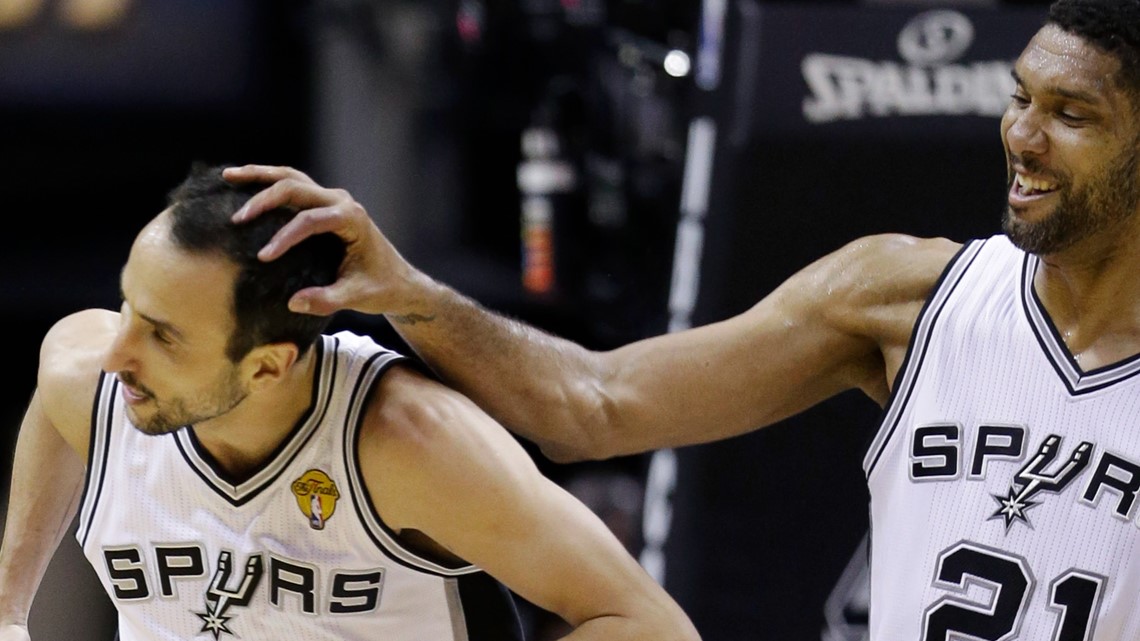
Ginobili closed his remarks in English by answering a question about how out of the ordinary it was for someone to grow up where he did as a basketball person in a basketball family. As he did, he stopped as he realized he was getting ahead of himself to Saturday’s induction speech.
“At the moment of my draft year 1999, no Argentinian ever played in the NBA. So what happened? Then, you know, we were a bunch. The goal or the dream of playing in the NBA was unrealistic growing up, but I did invest a lot of time with the ball, shooting, dribbling and just breathing basketball,” he said.
“It was out of the ordinary, but I mean, if you take the whole country, Argentina, soccer crazy, like soccer is here, all the other sports are [lower] in popularity. My city is an outlier, my city is a basketball city. They love soccer too, but it’s a basketball city and everybody talked about basketball and we played. We had, in our city when I was born probably 250,000, we had 22, 20 teams, every age, and we competed every single weekend, and we went pretty hard. So, you know, my dad was a big fan. My two brothers already played. I grew up a block - I’m basically telling my speech now, I gotta stop,” he said as laughter filled the room. “I gotta stop. Something's going on here. I’m just spoiling it.”
Then he continued to tell us a bit more about the kid from Bahía Blanca who got all the way to Springfield, and how crazy it still seems.
“Being so close to the court, I was there the whole day,” he said. “And we talked basketball, we played all day long, all year long. So it was not that unusual to have a family of basketball players and lovers. The unusual part is ending up here. I mean, that's not something that happens.”

